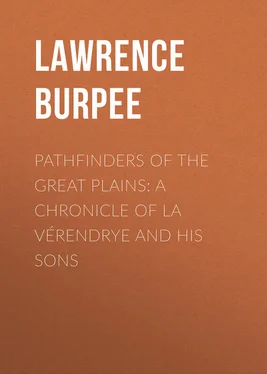Lawrence Burpee - Pathfinders of the Great Plains - A Chronicle of La Vérendrye and his Sons
Здесь есть возможность читать онлайн «Lawrence Burpee - Pathfinders of the Great Plains - A Chronicle of La Vérendrye and his Sons» — ознакомительный отрывок электронной книги совершенно бесплатно, а после прочтения отрывка купить полную версию. В некоторых случаях можно слушать аудио, скачать через торрент в формате fb2 и присутствует краткое содержание. Жанр: foreign_antique, foreign_prose, на английском языке. Описание произведения, (предисловие) а так же отзывы посетителей доступны на портале библиотеки ЛибКат.
- Название:Pathfinders of the Great Plains: A Chronicle of La Vérendrye and his Sons
- Автор:
- Жанр:
- Год:неизвестен
- ISBN:нет данных
- Рейтинг книги:3 / 5. Голосов: 1
-
Избранное:Добавить в избранное
- Отзывы:
-
Ваша оценка:
- 60
- 1
- 2
- 3
- 4
- 5
Pathfinders of the Great Plains: A Chronicle of La Vérendrye and his Sons: краткое содержание, описание и аннотация
Предлагаем к чтению аннотацию, описание, краткое содержание или предисловие (зависит от того, что написал сам автор книги «Pathfinders of the Great Plains: A Chronicle of La Vérendrye and his Sons»). Если вы не нашли необходимую информацию о книге — напишите в комментариях, мы постараемся отыскать её.
Pathfinders of the Great Plains: A Chronicle of La Vérendrye and his Sons — читать онлайн ознакомительный отрывок
Ниже представлен текст книги, разбитый по страницам. Система сохранения места последней прочитанной страницы, позволяет с удобством читать онлайн бесплатно книгу «Pathfinders of the Great Plains: A Chronicle of La Vérendrye and his Sons», без необходимости каждый раз заново искать на чём Вы остановились. Поставьте закладку, и сможете в любой момент перейти на страницу, на которой закончили чтение.
Интервал:
Закладка:
The year after his return from the expedition to Deerfield, Pierre de La Vérendrye took part in another raid against the English settlements. On this occasion, however, the attack was not upon a New England village, but against the town of St John's, in Newfoundland. The expedition was commanded by an officer named Subercase, who afterwards became governor of Acadia. St John's was defended by two forts, with small English garrisons. The French, who had about four hundred and fifty soldiers, found themselves unable to capture the forts. They therefore abandoned the attack on St John's and returned to the French settlement of Placentia, burning, as they went, a number of English fishing villages along the shore.
This kind of warfare could not bring much honour to a young soldier, and it was probably joyful news to Pierre to learn that he had been appointed an ensign in the Bretagne regiment of the Grenadiers serving in Flanders. He sailed from Canada in 1706, and for three years fought with his regiment in what was known as the War of the Spanish Succession, in which the English armies were commanded by the famous Duke of Marlborough. Finally, at the terrible battle of Malplaquet, in which thousands of both English and French were killed, Pierre so distinguished himself that he won the rank of lieutenant. He received no less than nine wounds, and was left for dead upon the field. Fortunately he managed to escape, to render to his country in the years to come much greater service.
Finding that there was little hope of further promotion in the French army, since he had no influence in high quarters, Pierre returned to Canada. After several years' service in the colonial forces, he abandoned the army, and engaged in the fur trade. As a boy at Three Rivers, he had enjoyed many chances of meeting the fur-traders who came down to the little town on the St Lawrence with their packs of valuable peltry, and had shown an especial and fascinated interest in their stories of the boundless country that lay north and west of the string of settlements on the St Lawrence. This country was so vast in extent that even the most remote tribes yet visited by the white traders could state nothing definite as to its outer boundaries, though, in answer to the eager questions of the white men, they invented many untrue tales about it.
The fur-traders themselves were divided into two classes. The more staid and respectable class built trading forts in the interior on the borders of territories occupied by the Indians. Here they kept a supply of the things required by the natives: guns, powder and balls, tobacco, blankets, bright-coloured cotton, axes and small tools, flints and steels, vermilion for war-paint, and beads of every colour and description. The Indians brought their furs into the forts and bartered them for the goods that they needed. Sometimes, with no sense of real values, they traded beaver skins and other pelts of high worth for a piece of gaudy cotton, a little vermilion, or a handful of beads. The white men, of course, brought things which rapidly became indispensable to the Indians, whose native bows and arrows and hatchets of stone seemed almost useless compared with the muskets and the steel axes brought from Europe. To acquire these things became vital to the Indians, and the traders who now supplied them acquired each year thousands of beautiful furs. These were tied up securely into packs and carried in canoes down to Montreal or Three Rivers, where they were bought by the great merchants and sent by ship to France. The furs that had been bought from the Indian for a mere trifle fetched hundreds of francs when they finally reached Paris.
The second class of traders, known as coureurs de bois, or wood-runners, were very different from the first. Speaking generally, they were young men, sometimes of good family, who found life in the older towns and settlements prosaic and uninteresting, and when they went to the interior did not care to be tied down to the humdrum existence of the trading forts. Instead of requiring the Indians to bring their furs down to some fort, these enterprising rovers of the forest went into the Indian country. Sometimes they took light trading goods with them to barter with the redskins for furs, but oftener they themselves hunted and trapped the beaver, the otter, and the fox. The coureurs de bois were generally men of reckless courage, ready to face danger and hardship. From long living among the savages they themselves became in time half savage. Some of them took Indian wives and were adopted into the tribes.
When one of these wood-runners had obtained a quantity of furs, he made them up into packs, loaded them carefully in his canoe, and set out for the distant settlements, Montreal, Three Rivers, or Quebec. He knew the wild northern streams as well as any Indian; he could run his canoe safely down a rapid where an inch one way or the other would dash it against the rocks; and he could paddle all day with only an occasional stop for a meal or a smoke. When he came to an impassable rapid or waterfall, he beached his canoe and carried everything – canoe, packs, gun, and provisions – overland to the navigable water ahead. At night he pulled his canoe ashore, built a campfire, and cooked over the flames a partridge, a wild duck, or a venison steak. If he had not been fortunate enough to meet with such game, he made a simple meal of pemmican – dried venison mixed with fat – a supply of which he always carried in a bag in case of need. Then he smoked his pipe, rolled himself in his blanket, placed his gun within reach, and slept soundly until the sun awakened him on the following morning. When he reached the far-off towns on the St Lawrence, he traded part of his furs for any goods which he needed, and was only too likely to get rid of the rest in dissipation. As soon as his money was spent, he would turn his back on civilization and live once more the wild life of the Indian country.
From such men as these, who were constantly to be seen in the little town of Three Rivers, Pierre de La Vérendrye heard many stories of the wonderful country that lay far towards the setting sun. They told him of mighty rivers and great lakes. Some of these they had seen; others they had heard of from the Indians. Always the young man heard rumours of a great Mer de l'Ouest , or Western Sea, which French explorers had been seeking ardently ever since the days of Jacques Cartier and Samuel Champlain. In the earlier days, when the French first came to Canada, this Western Sea was supposed to be somewhere above Montreal. Probably the Indians who first spoke of it to Jacques Cartier meant nothing more than Lake Ontario. Then, in the days of Champlain, the sea was sought farther westward. Champlain heard rumours of a great water beyond the Ottawa river. He paddled up the Ottawa, reached Lake Nipissing, and, descending what is now known as French River, found the immense body of water of which the Indians had told him. He had discovered Lake Huron, but this, again, was not the Western Sea. Other explorers, following in his footsteps, discovered Lake Michigan and Lake Superior; but still neither of these was the Western Sea. So, in La Vérendrye's day, men were dreaming of a Western Sea somewhere beyond Lake Superior. How far was it westward of Lake Superior? Who could tell? The Indians were always ready with a plausible tale, and many believed that the Western Sea would still be found at no great distance beyond the uppermost of the Great Lakes.
La Vérendrye was a young man of ambition and imagination. The spirit of adventure called him to a great exploit in discovery, as it had called earlier explorers French in blood – Jacques Cartier and Champlain and Radisson, Nicolet and Etienne Brulé, Marquette and La Salle. They one and all had sought diligently for the Western Sea; they had made many notable discoveries, but in this one thing they all had failed. La Vérendrye determined to strive even more earnestly than any of his great predecessors to discover a way to the Western Sea, not so much for his own advantage as for the honour and glory of his native country. This great idea had been taking form in his mind from the days of his early boyhood, when, seated before the great log fire in his father's home in Three Rivers, he had first listened to the stirring tales of the woodrunners.
Читать дальшеИнтервал:
Закладка:
Похожие книги на «Pathfinders of the Great Plains: A Chronicle of La Vérendrye and his Sons»
Представляем Вашему вниманию похожие книги на «Pathfinders of the Great Plains: A Chronicle of La Vérendrye and his Sons» списком для выбора. Мы отобрали схожую по названию и смыслу литературу в надежде предоставить читателям больше вариантов отыскать новые, интересные, ещё непрочитанные произведения.
Обсуждение, отзывы о книге «Pathfinders of the Great Plains: A Chronicle of La Vérendrye and his Sons» и просто собственные мнения читателей. Оставьте ваши комментарии, напишите, что Вы думаете о произведении, его смысле или главных героях. Укажите что конкретно понравилось, а что нет, и почему Вы так считаете.












